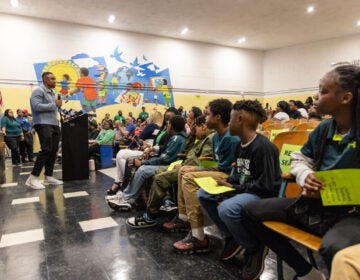KIPP backs out of deal to buy vacant Philadelphia school
Citing uncertainty about its pending requests to expand, KIPP Philadelphia has backed away from a deal to buy long-abandoned Rudolph Walton Elementary from the Philadelphia School District. KIPP had agreed to buy the 111-year old building at 28th and Huntingdon Streets in North Philadelphia for $320,000 that’s been vacant since 2003.
Citing uncertainty about its pending requests to expand, KIPP Philadelphia has backed away from a deal to buy long-abandoned Rudolph Walton Elementary from the Philadelphia School District.
KIPP, one of the city’s largest and most prominent charter school operators, had agreed to buy the 111-year old building at 28th and Huntingdon Streets in North Philadelphia for $320,000. The school, now a magnet for graffiti and trash, has been sitting empty since 2003.
KIPP hoped to renovate the building to the tune of $13 million, then move in its DuBois Collegiate Academy high school program, and possibly its North Philly middle school, to the site. But CEO Marc Mannella said the financial risk of such a move was too great without a guarantee from the district that KIPP would be allowed to enroll enough students to fill the school.
“Given the ambiguity,” said Mannella, “we had to walk away.”
The failed Walton deal comes as a blow to the cash-strapped district, which is currently sitting on ten surplus properties. Many are severe eyesores in already blighted neighborhoods. Twenty-three additional buildings have been approved for closure by next September.
“It’s disappointing, but that’s the way sales are,” said district spokesman Fernando Gallard. “We are going to recommit and market this property to find the right user.”
The failed Walton deal also highlights the interrelated — but highly fraught — strands of the district’s concurrent drives to close dozens of schools, expand charters, and manage a deep financial crisis.
To make its purchase and renovation of Walton a secure investment, said Mannella, KIPP needed to enroll hundreds more students at DuBois Collegiate.
KIPP, which currently operates four schools in Philadelphia, has submitted a formal request to the district to grow by a total of roughly 900 students, under a number of possible scenarios. That expansion push was recently supported by a $1.6 million grant from the Philadelphia School Partnership.
“We’re trying to leave every possible door open for the [School Reform Commission] if they want KIPP to expand in this town,” said Mannella.
But with a deep budget shortfall still to be closed for next year, the district was unwilling to grant KIPP hundreds of new seats in advance of the formal renewal process, expected to begin sometime next month. Officials estimate that KIPP’s expansion would cost the district about $6 million per year. District officials said each new seat in a charter school costs the city’s traditional public school system about $7,000 per year.
“The district’s process of selling unoccupied school buildings is totally separate from any policies regarding charter school growth,” said Gallard.
As a result, the district will miss the opportunity to move one of its hardest-to-sell properties — a 69,000-square-foot building with no elevator or kitchen.
The North Philly community surrounding Walton will lose out on an opportunity to see a neighborhood eyesore turn into a functioning institution.
And KIPP, whose North Philly schools have performed well, will miss the opportunity to find a stable home for its high school program. DuBois Collegiate is currently housed in the former FitzSimons Middle School, but KIPP’s lease on the building is only good for one year.
“This is why other charter operators don’t want to come to this town,” said a frustrated Mannella.
The rampant instability in the Philadelphia school system, he said, “makes it borderline impossible to operate here.”
This story was reported through a partnership in education coverage between WHYY/NewsWorks and the Public School Notebook.
WHYY is your source for fact-based, in-depth journalism and information. As a nonprofit organization, we rely on financial support from readers like you. Please give today.




